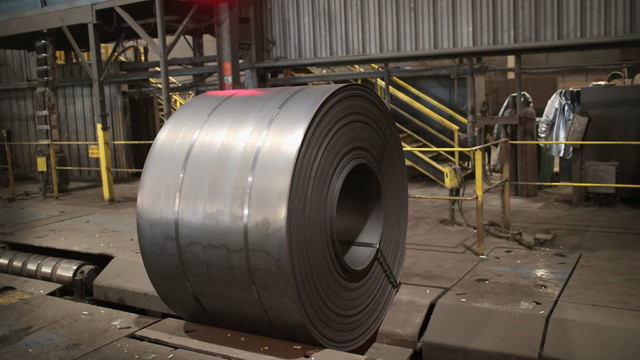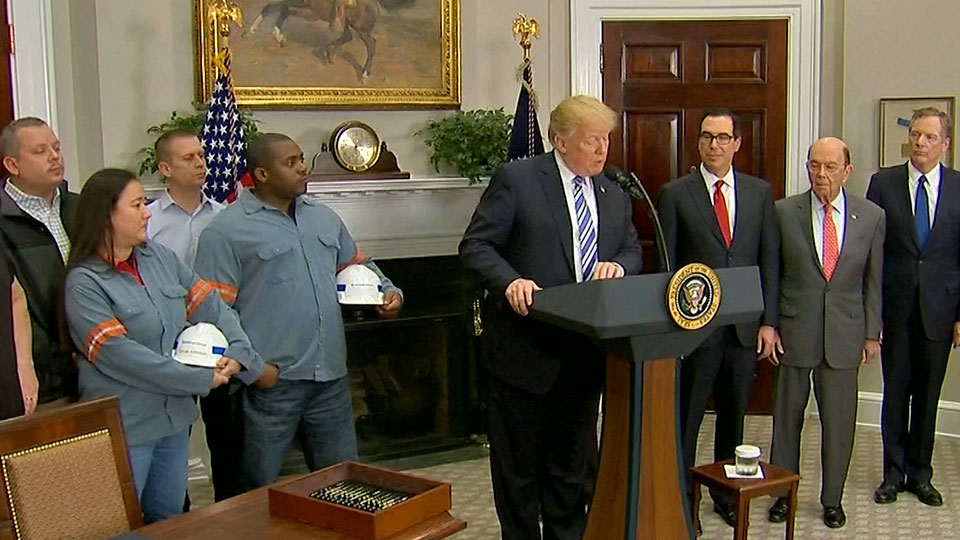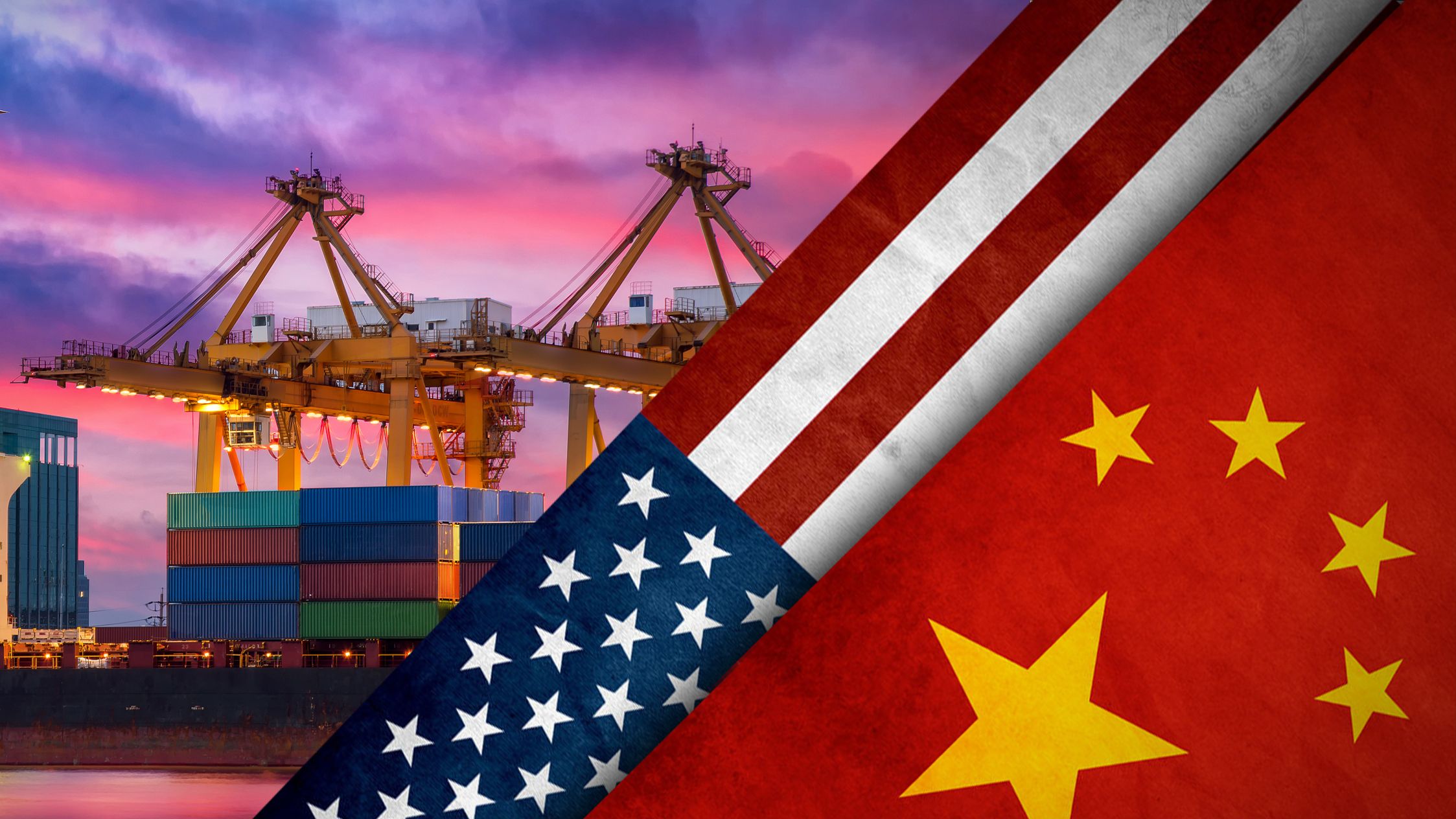U.S. tariffs on steel and aluminum imports go into effect on Friday, and in addition, the Trump administration may introduce additional tariffs against China.
This has set off a storm of lobbying in Washington, with several retail groups pleading with the White House to reconsider prevent a potential trade war.
CGTN’s Nathan King reports.
At least 45 trade group are united around a single message to the White House: tariffs will cause more harm than good.
“Tariffs are a hidden tax on Americans – plain and simple,” read one portion of a letter from the American Apparel & Footwear Association, which represents companies such as Walmart. “More than 41 percent of clothing, 72 percent of footwear, and 84 percent of travel goods sold in the U.S. are made in China. A tariff on these products would be a tax on every American.”
The letter said that in addition to increasing costs for American families, planned trade measures could result in retaliatory tariffs targeting American businesses. At the end of the day, the trade group contends, American families, workers, and business would be devastated with job losses and other harmful effects.
The big push against these tariffs comes after Trump asked for a range of options to close the trade gap with China. The American president seems to focus on this number above all others when it comes to international commerce.
Despite advice to the contrary from economists and some of his staff, Trump seems determined to go ahead. The tariffs could be in the range of $30 to 60 billion, or even higher.
While the focus will likely be on consumer electronics, other products from furniture to toys may be included.
As with Trump’s steel and aluminum tariffs, these other proposed tariffs could be rolled back. But U.S. businesses fear that damage to supply chains could come quickly. Companies are also worried about Chinese retaliation, as well.
Beijing is waiting to see what the announcement is before taking any action, but has in the meantime been in close contact with U.S. officials at all levels.
Yang Jechi and Liu He, top Chinese foreign affairs and economic officials, have made high-level visits to Washington, and the U.S. ambassador in China has been busy shuttling back and forth.
China’s Foreign Ministry said on Monday that the proper way to deal with all trade differences is negotiation.
“I want to reiterate that under the current situation, to benefit oneself at a neighbors’ expense, or attack others at random, will be neither helpful nor effective in solving the issue,” according to spokesperson Hua Chunying. “Such acts are definitely not constructive.”
Adding to the problem are measures Washington is considering in addition to the proposed tariffs. Action against Chinese investment in the U.S., and curtailing of Chinese students visas are just two possibilities. If these steps were to be taken, China would then be forced to respond.
Any tit-for-tat Chinese response could hurt the U.S. in a big way, impacting everything from Boeing aircraft to soybeans in Iowa.
As China has said: a trade war could hit both economies – and the world – very hard.
Ralph Winnie discusses key takeaways from China’s Two Sessions 2018
China’s Two Sessions is wrapping up, with several big changes having been made in terms of Chinese leadership, and how China is positioning itself for the future. Ralph Winnie, director of the Eurasian Business Coalition’s China Program, discusses with CGTN’s Mike Walter.
 CGTN America
CGTN America
 PORTAGE, IN – MARCH 15: Steel coils produced at the NLMK Indiana steel mill are prepared for shipping on March 15, 2018 in Portage, Indiana. The coils, which are custom made to customer specifications, weigh an average of nearly 25 tons. The mill, which is projected to produce up to 1 million tons of steel from recycled scrap in 2018, is considered a “mini mill” by U.S standards. NLMK Indiana is a subsidiary of NLMK, one of Russia’s largest steel manufacturers, responsible for nearly a quarter of Russias steel production. Steel producers in the U.S. and worldwide are preparing for the impact of the recently-proposed tariffs by the Trump administration of 25 percent on imported steel. (Scott Olson/AFP)
PORTAGE, IN – MARCH 15: Steel coils produced at the NLMK Indiana steel mill are prepared for shipping on March 15, 2018 in Portage, Indiana. The coils, which are custom made to customer specifications, weigh an average of nearly 25 tons. The mill, which is projected to produce up to 1 million tons of steel from recycled scrap in 2018, is considered a “mini mill” by U.S standards. NLMK Indiana is a subsidiary of NLMK, one of Russia’s largest steel manufacturers, responsible for nearly a quarter of Russias steel production. Steel producers in the U.S. and worldwide are preparing for the impact of the recently-proposed tariffs by the Trump administration of 25 percent on imported steel. (Scott Olson/AFP)


